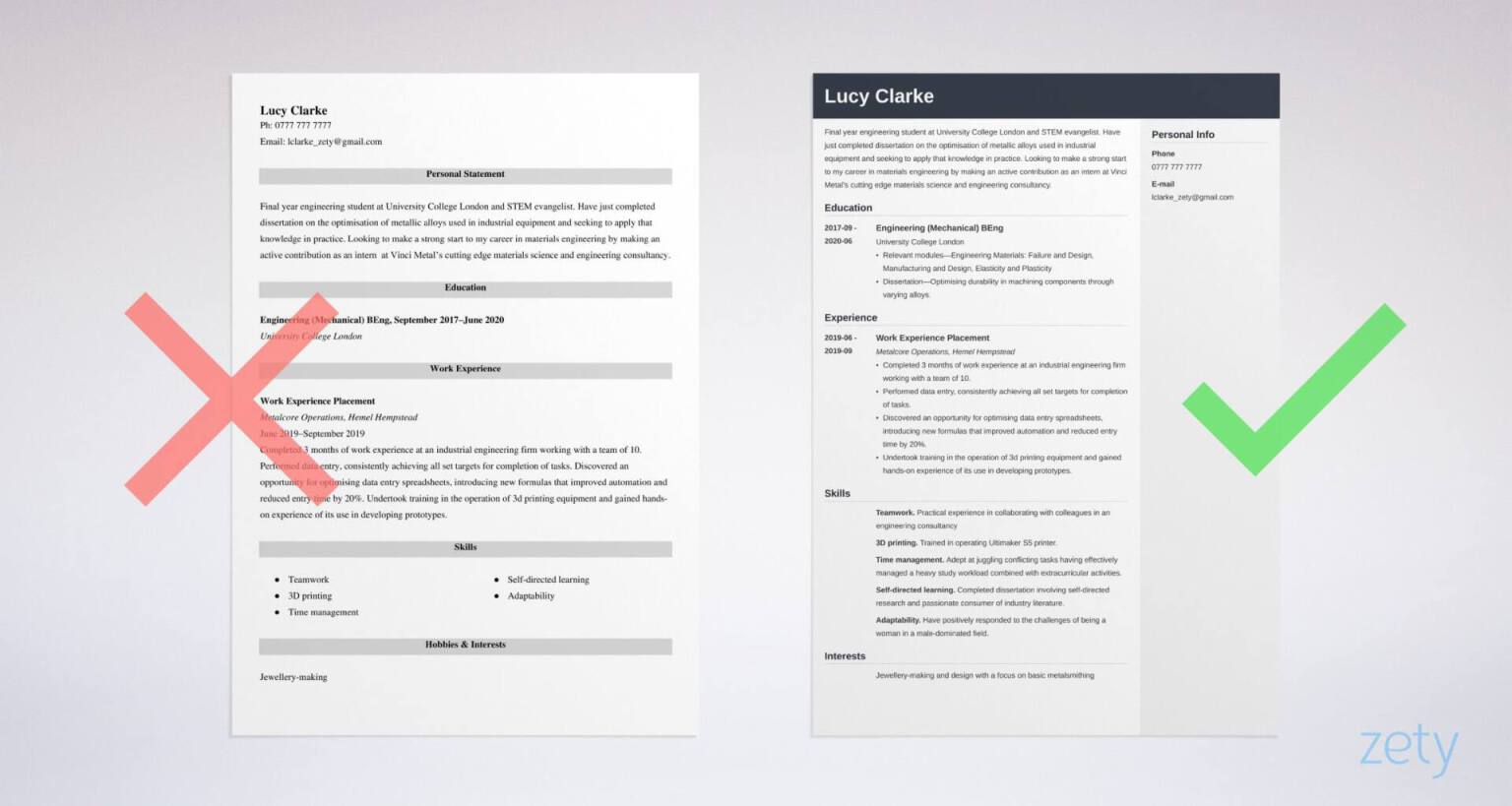Internship CV: Sample and How to Write (10+ Templates)
Create your CV nowA good degree is important but employers want more. You need practical experience to match your academic achievements. Landing a top internship is one the best ways to make a strong start to your career, and the stats prove it. 85% of companies use internships to recruit for full-time roles, with former interns estimated to fill 37% of graduate vacancies.
If you want a piece of the action, you’ll need a standout internship CV.
Read on and you’ll see a professional internship CV example you can adjust and make yours. Plus, you’ll learn an easy formula for writing a CV for internships that will land you 10x more interviews than any other CV you’ve written before.
Want to save time and have your CV ready in 5 minutes? Try our CV builder. It’s fast and easy to use. Plus, you’ll get ready-made content to add with one click. See 20+ CV templates and create your CV here.
Sample CV made with our builder—See more CV samples here.
Already got an internship and ready to apply for a permanent role? Check out our guides:
- Care Assistant CV Example & Guide
- Graphic Designer CV Example & Guide
- Project Manager CV Example & Guide
- Teacher CV Example & Guide
- Teaching Assistant CV Example & Guide
- Customer Service CV Example & Guide
- Retail Sales Assistant CV Example & Guide
- Receptionist CV Example & Guide
- Support Worker CV Example & Guide
- Academic CV Example & Guide
Engineering Internship CV Example
Lucy Clarke
Ph: 0777 777 7777
Email: lclarke_zety@gmail.com
Final year engineering student at University College London and STEM evangelist. Have just completed dissertation on the optimisation of metallic alloys used in industrial equipment and seeking to apply that knowledge in practice. Looking to make a strong start to my career in materials engineering by making an active contribution as an intern at Vinci Metal’s cutting edge materials science and engineering consultancy.
Education
Engineering (Mechanical) BEng, September 2017–June 2020
University College London
- Relevant modules—Engineering Materials: Failure and Design, Manufacturing and Design, Elasticity and Plasticity
- Dissertation—Optimising durability in machining components through varying alloys.
Work Experience
Work Experience Placement
Metalcore Operations, Hemel Hempstead
June 2019–September 2019
- Completed 3 months of work experience at an industrial engineering firm working with a team of 10.
- Performed data entry, consistently achieving all set targets for completion of tasks.
- Discovered an opportunity for optimising data entry spreadsheets, introducing new formulas that improved automation and reduced entry time by 20%.
- Undertook training in the operation of 3d printing equipment and gained hands-on experience of its use in developing prototypes.
Skills
- Teamwork. Practical experience in collaborating with colleagues in an engineering consultancy
- 3D printing. Trained in operating Ultimaker S5 printer.
- Time management. Adept at juggling conflicting tasks having effectively managed a heavy study workload combined with extracurricular activities.
- Self-directed learning. Completed dissertation involving self-directed research and passionate consumer of industry literature.
- Adaptability. Have positively responded to the challenges of being a woman in a male-dominated field.
Hobbies & Interests
- Jewellery-making and design with a focus on basic metalsmithing
Now here’s the job-winning internship CV formula.
1. Structure Your Internship CV Template Properly
An internship is an opportunity offered by employers to students and graduates to gain work experience for a fixed period of time. Your internship CV needs to be carefully researched and focus on the needs of the employer. It also needs to highlight a strong set of soft skills to show you can thrive and make a valuable contribution to the workplace.
Speaking of skills, think of your CV for an internship as a test of your written communication skills, which consistently feature at the top of the list for recruitment ‘must-haves’. Here’s how to get it right.
- Use the right CV format. The most popular for candidates and recruiters alike is chronological format. It’s easy to read and compatible with the ATS software that most employers use to scan internship applications.
- Create a clear CV header with your contact information. Make your name stand out with a font 4–6 points larger than your body text. Then include your phone number, email address and LinkedIn profile, plus links to social media profiles if they’re relevant to the internship. But leave out your postal address, it’s just a waste of space.
- Don’t include a photo, it’s not the done thing in the UK, and leave out personal details like your date of birth.
- Use a professional CV layout that creates plenty of white space for ease of reading and clean design. Set your margins to one inch on each side of the page, choose a good CV font set to 11–12 points and set line spacing to 1.15.
- Divide your CV into clear sections, double-space between sections and use clear section headings.
- These are the sections a cover letter for an internship should contain, from top to bottom in this order:
- Header with contact information
- Personal statement/CV profile
- Education
- Work experience
- Skills
- Additional sections (e.g. Volunteering, Hobbies and Interests, Languages etc.)
- And unless the job advert says otherwise, save your CV as a PDF, it’s the best way to preserve all the hard work you’ve done creating a perfect layout.
So where do we begin? With your education section. At this stage of your career, it’s the most important section on your CV. And don’t worry, we haven’t forgotten about your personal statement, we’ll cover that later.
Read more: CV Format: Best Examples for Career Success
2. Start With an Internship CV Education Section
As your career progresses, this section will swap place with your work experience. But if you’re still studying, or a recent graduate, it should come first. Here’s what you need to include.
- The name of your university, your degree, and your dates of attendance (expected graduation date if you’re still studying.
- If you have a post-graduate degree, use reverse-chronological order and put the degree you completed most recently first.
- Only mention honours if they’re a 2:1 or a first.
But that’s not all, you won’t have much work experience to draw on, if any, so you need to add more detail to your academic achievements. Add 1–2 bullet points listing relevant modules, academic achievements and extracurricular activities. Here’s how it should look.
Internship CV Sample—Education Section
Engineering (Mechanical) BEng, September 2017–June 2020
University College London
- Relevant modules—Engineering Materials: Failure and Design, Manufacturing and Design, Elasticity and Plasticity
- Dissertation—Optimising durability in machining components through varying alloys.
As you can see, it just doesn’t just list the candidate’s education, it gives specific detail that’s directly relevant to the internship they’re targetting. Now let’s move on to your work experience section.
Read more: Best CV Structure: How to Set out a Perfect CV
3. Write Your Internship Work Experience Section
If you have no work experience at all then you can skip this section. But if you do have any experience, paid or unpaid, make the most of it. Here’s what you need to do.
- Use reverse chronological order, so start with your most recent job and work back from there.
- Include up to six bullet points for each job entry. But don’t just list your duties. Follow this strategy for an impactful work experience section:
- Target this section to match the internship requirements. Refer to the advert to see what the employer needs from an intern, then include achievements and experience that are relevant to the position.
- Quantify experience and achievement with numbers wherever possible.
- Start each bullet point with a punchy action word e.g. assisted, completed or acted.
- Structure your experience using the PAR (Problem-Action-Result) technique.
Here’s an example so you can see what I mean.
Internship CV Example—Work Experience Section
| Right |
|---|
|
| Wrong |
|---|
|
They look completely different, right? But the truth is, they’re both from the same candidate. The first example uses the PAR technique to add structure. Problem, action and result, a great way of not just saying what you did, but proving how well you did it.
There are numbers too and action verbs starting each sentence. Compare it to the second example which is just a shopping list of what the candidate was ‘responsible for’. Not exactly a great sales pitch.
And even if it’s not industry-specific experience you should still include it. For example, if you’ve done part-time retail work while studying, emphasise the soft skills you gained like teamwork and communication. They’ll still add weight to your application.
Pro Tip: Think you don’t have any experience? Think again. Volunteering, part-time work and work experience placements all count.
Next, we’ll move on to your skills section.
Read more: What to Include in a Work Experience CV Section
Making a CV with our builder is incredibly simple. Follow our step-by-step guide, use ready-made content tailored to your job and have a CV ready in minutes.
When you’re done, Zety’s CV builder will score your CV and tell you exactly how to make it better.
4. List Skills Relevant to the Internship You’re After
Internships exist in many different industries. There’s no set list of skills that’s applicable to everyone. So how do you choose which skills are best to put on your Internship CV?
- Carefully read the job advert to determine which skills are required by the role. Look at the job description and it’ll tell you exactly what the hiring manager wants. Look for keywords like customer service and content creation and write them down in a list.
- Then make a list of your own skills. Look back over your education and work experience sections to jog your memory.
- Then compare the two lists, see what matches, and choose 5–10 of those to include in your CV.
- Aim for a mix of soft skills, hard skills and technical skills. But soft skills are particularly important for a CV for an internship.
- For each skill, add a sentence showing how you demonstrate it. Don’t just show, tell. E.g. Content creation. Regular contributor to popular music blog, confident in creating written content with WordPress.
There’s no one size fits all approach to internship skills, but this list contains skills that are considered valuable by every employer.
Internship CV Skills
- Time management
- Critical thinking
- Written communication
- Research and analysis
- Adaptability
- Initiative
- Interpersonal skills
- Problem-solving
- Technology skills
- Computer skills
- Self-directed learning skills
Read more: Key Skills to Put on a CV: Best List of Top Skills
5. Add Extra Sections to your Internship CV
Your CV for an internship is going to have a lot of competition. The Institute of Student Employers estimates there are 75+ candidates for each vacancy. A great way to make yourself stand out is to add extra sections that round out your skills and experience.
- Add a languages section. Being bilingual can definitely improve your job prospects.
- Volunteering. A survey by Deloitte revealed that 82% of managers prefer candidates with volunteering experience.
- Hobbies and interests work too. If it helps to demonstrate a skill or is directly related to the industry you’ll intern in then it’s perfect.
- Other ideas could include projects and awards. Anything that helps to make you stand out as a suitable candidate is worth including.
Read more: Best Hobbies and Interests to Put on a CV
6. Condense the Best Parts into an Internship CV Personal Statement
Back to the beginning now. The rest of your CV is written so you’ve got everything you need to write your personal statement or CV profile.
As the first section of your CV it needs to be compelling. In just 3–4 sentences you need to convince the hiring manager your CV is worth reading. That sounds tough I know, but all you need to do is answer three questions.
- Who are you?
- What can you offer to the employer?
- What are your career goals?
And here’s how to answer them:
- List your skills, strengths and experience. Focus on your education and any work experience you have. Highlight anything that would help you perform well in the internship you’re targeting.
- Next, choose 3–4 items from your list that match up with the desired skills and experience in the job advert. Then combine them with passion for the role, and knowledge about the employer to prove that you’ll be a good fit.
- This process is what’s known as ‘tailoring’ your CV, and it’s one of the best things you can do to improve your chances of success.
Here are some examples:
Internship CV Personal Statement Examples
| Right |
|---|
Final year engineering student at University College London and STEM evangelist. Have just completed dissertation on the optimisation of metallic alloys used in industrial equipment and seeking to apply that knowledge in practice. Looking to make a strong start to my career in materials engineering by making an active contribution as an intern at a cutting edge materials science and engineering consultancy. |
| Wrong |
|---|
Final year engineering student at University College London. Looking to complete an internship to gain valuable hands-on experience for my future career in engineering. Due to graduate with 2:1 honours and particularly interested in the field of materials engineering. |
Once again, it’s the same candidate. But just look at the difference. The first example is brimming with energy and passion. It’s highly focussed too and lets the employer know the candidate has specialist knowledge in their field.
The second? Well, it’s yawn-inducing. Nice enough, but it’s hardly likely to grab the recruiter’s attention.
And that’s your CV for an internship complete. Also, try to avoid badly designed free CV templates, stick with expert designed examples like Zety's instead. But there’s one more thing you need to consider.
Read more: How to Write a CV Personal Statement
7. Always Write an Internship Cover Letter
I know what you’re thinking. Nobody writes letters anymore. And you’ve got a point, but let me assure you that in the world of recruiting they’re still essential. In fact, more than half of hiring managers consider them a must-have.
Here’s how to write a cover letter for an internship in no time.
- Address your cover letter correctly and use the right cover letter format.
- Put a ‘hook’ in your cover letter opening. Show energy and passion, and include an impressive achievement that’ll make you stand out as a candidate.
- Demonstrate how your skills and experience will help you to excel in the job you’re applying for. Like your CV, tailor your cover letter to each new job you target.
- Put a call to action in your cover letter ending asking to meet or schedule a phone call to discuss the job further.
- Stick to the right cover letter length.
And one last tip. Follow up. If you haven’t heard back about the internship within a week of the closing date, contact the employer by email or phone about the status of your application. It’s a great way of improving your chances of getting an interview.
Read more: What to Include in a Cover Letter for a Job [15+ Examples]
Plus, a great cover letter that matches your CV will give you an advantage over other candidates. You can write it in our cover letter builder here. Here's what it may look like:
See more cover letter templates and start writing.
Key Takeaway
Here’s a recap of what we’ve covered:
- Structure your CV professionally with the right CV format and layout.
- Write an education and work experience section tailored to the internship you’re targeting.
- Include a list of relevant skills.
- Add extra sections to stand out from the crowd.
- Write a cover letter to complement your internship CV.
Thanks for reading. Internships cover a broad range of job sectors so if you’ve got specific questions, please ask. Would you like to know about a CV for a summer internship or perhaps a CV for a finance internship? Ask me in the comments section and I’ll be happy to help.
About Zety’s Editorial Process
Our editorial team has thoroughly reviewed this article to ensure it follows Zety’s editorial guidelines. Our dedication lies in sharing our expertise and providing you with actionable career advice that offers you real value. Every year, the quality of our content attracts 40 million readers to our site. But that’s not all – we conduct original research to gain a detailed understanding of the labour market. We take pride in being cited by top universities and leading media outlets in the UK and worldwide.
Sources
- https://www.luzerne.edu/career/pdfs/SoftSkillsintheWorkplace.pdf
- https://www.lonestar.edu/departments/careerservices/PAR-Technique.pdf
- https://cdn.ymaws.com/ise.org.uk/resource/resmgr/docs/ISE_Showcase_Guide_2018.pdf
- https://www.uei.edu/blog/can-speaking-two-languages-increase-your-job-prospects/
- https://www2.deloitte.com/content/dam/Deloitte/us/Documents/us-deloitte-impact-survey.pdf






